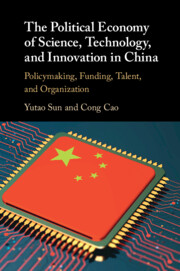 The Political Economy of Science, Technology, and Innovation in China
The Political Economy of Science, Technology, and Innovation in China Book contents
- The Political Economy of Science, Technology, and Innovation in China
- The Political Economy of Science, Technology, and Innovation in China
- Copyright page
- Dedication
- Contents
- Figures
- Tables
- Acknowledgments
- Abbreviations
- Introduction
- 1 Studying Science, Technology, and Innovation
- 2 Innovation Policies
- 3 Innovation Policies
- 4 Funding
- 5 Talent
- 6 Organization
- 7 Toward a Political Economy of Science, Technology, and Innovation in China
- References
- Index
3 - Innovation Policies
Policy Network and Policymaking Process
Published online by Cambridge University Press: 07 August 2023
- The Political Economy of Science, Technology, and Innovation in China
- The Political Economy of Science, Technology, and Innovation in China
- Copyright page
- Dedication
- Contents
- Figures
- Tables
- Acknowledgments
- Abbreviations
- Introduction
- 1 Studying Science, Technology, and Innovation
- 2 Innovation Policies
- 3 Innovation Policies
- 4 Funding
- 5 Talent
- 6 Organization
- 7 Toward a Political Economy of Science, Technology, and Innovation in China
- References
- Index
Summary
Taking the policy network approach, this chapter investigates three mechanisms – policy agenda, power concentration and heterogeneity dependence – underlying the evolution of inter-government agency relations in China. Operationally, the chapter adopts a social network analysis-based method to quantitatively study China’s innovation policy network. The findings show that the formal policy network for innovation has not only sustained through the intervention of policy agenda but also self-organized because of policy network’s nature of power concentration and heterogeneity dependence. The presence of such mixed mechanisms in the evolution of China’s innovation policy network differs from the findings from industrialized countries where self-organization plays a central role. The findings advance our theoretical understanding of the evolution of innovation policy network and have implications for policymaking in emerging economies.
Keywords
- Type
- Chapter
- Information
- The Political Economy of Science, Technology, and Innovation in ChinaPolicymaking, Funding, Talent, and Organization, pp. 63 - 96Publisher: Cambridge University PressPrint publication year: 2023


